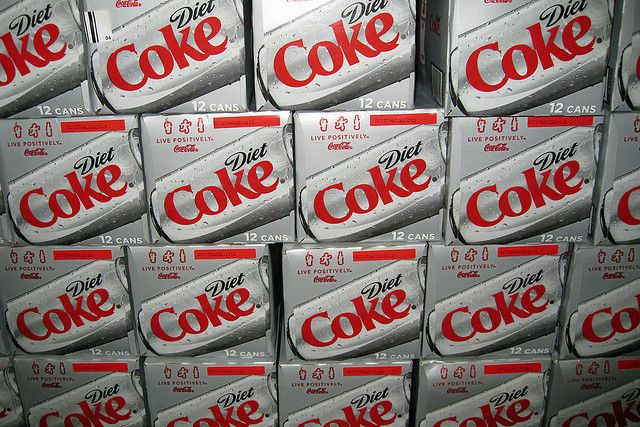Diet Soda Sales Decline: Are Artificial Sweeteners To Blame?

Although diet soda may have seemed like the healthier alternative to the sugary, fattening regular sodas, many people have turned away from them as of late — more so than those quitting regular soda — and this time, it has nothing to do with calories. Instead, the issue resides in diet soda’s artificial sweetening, which many people believe could be detrimental to their health.
According to a Wells Fargo analysis of Nielsen data, the last year has seen diet soda sales drop by seven percent, compared to only two percent for regular soda. Although the trend has been consistent over the past three years, according to Good Morning America, it was not always like that. In fact, between the late 1990s and 2010, when diet soda was considered the healthier alternative with zero calories, consumption rose from 26 percent to 31 percent, according to The Wall Street Journal.
But with more and more studies showing its detrimental effect to human health, many people have been ditching diet soda for healthier alternatives, even die-hard fans. “I loved drinking diet soda for nearly 30 years, because it was cold, convenient, carbonated,” Joanna Stepka, who had been drinking diet soda since kindergarten, told Good Morning America. But in August, she decided to stop drinking it after her personal trainer told her about the effects artificial sweeteners could have on the body.
Stepka isn’t alone either — many people are moving toward a less-processed food lifestyle. It’s “the biggest trend in food, really,” Laurie Demerit, CEO of consumer research and consulting firm, Hartman Group, told Time. “The drumbeat of trend is increasing and there’s now some other ingredients to fill the gap.” The “drumbeat,” Demerit says, is moving more toward natural options, such as vitamin water or coconut water, as well as Stevia, a natural sweetener made from a South American herb.
But are artificial sweeteners really bad for our health? Looking at individual cases, one British woman was literally addicted to diet coke, and drank up to eight liters of it each day. What’s worse, she had cut back from 16 liters because she was gaining too much weight. Diet soda addiction is real too: Government surveys have found that people who drink diet sodas consume an average of 26 ounces more per day, according to CNN.
An editorial published in the journal Trends in Endocrinology and Metabolism cites numerous studies that were conducted over the last 40 years, looking into the effects of saccharin, aspartame — in Diet Coke and Pepsi — and sucralose on health. Specifically, the studies found that drinking these artificial sweeteners in diet drinks caused weight gain, type 2 diabetes, metabolic syndrome, and hypertension and cardiovascular disease. Other studies have linked aspartame to cancer, The Wall Street Journal notes.
Trying to abate desertion, Coke launched a print ad campaign over the summer saying that its diet drinks were safe. “The safety of aspartame is supported by more than 200 studies over the last 40 years,” the ad said. Along with the ad, Coke was also relying on the singer Taylor Swift to promote the brand, using her signature on Diet Coke cans in October. Along with that, Coke has also been looking into natural options as well, recently buying an ownership stake in ZICO coconut water and looking into a Stevia variant that could be approved by the U.S. Food and Drug Administration in the coming weeks. “Our industry believes in the soft drink business,” a spokesperson for the American Beverage Association told Time, “and sees opportunity for continued innovation and growth.”



























